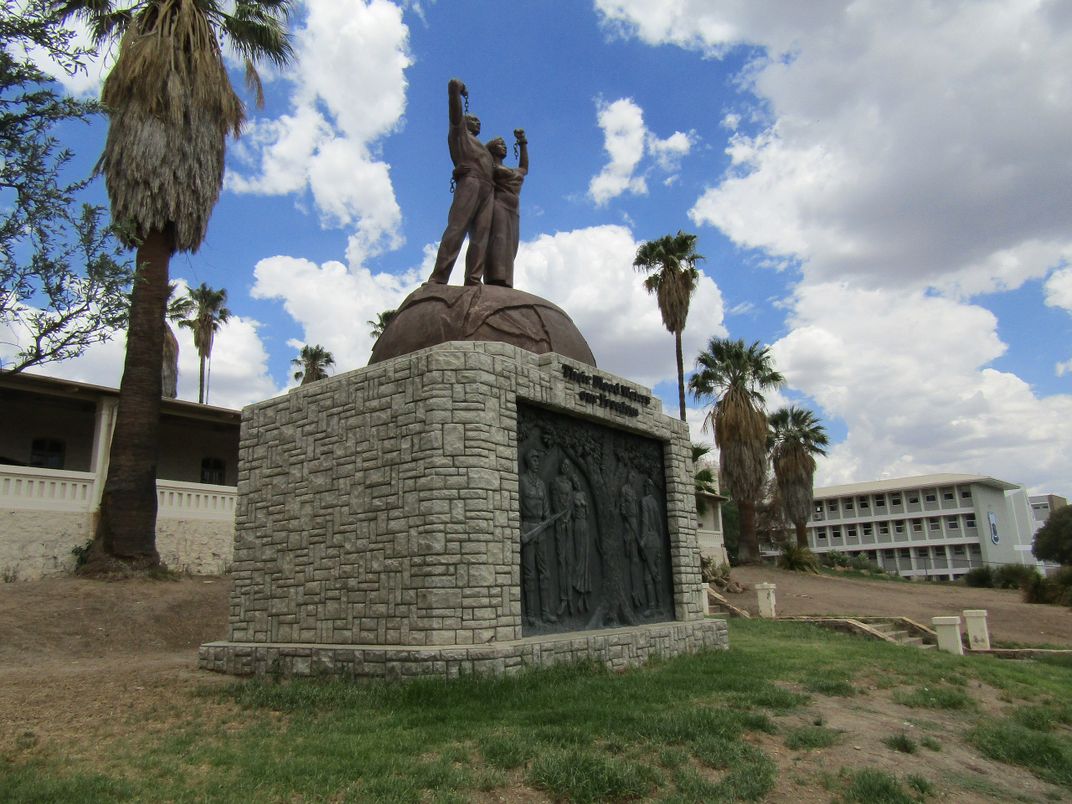Germany Acknowledges Genocide in Namibia but Stops Short of Reparations
Between 1904 and 1908, colonial forces murdered tens of thousands of Herero and Nama people
:focal(2428x1857:2429x1858)/https://tf-cmsv2-smithsonianmag-media.s3.amazonaws.com/filer/19/10/1910df29-69bb-4724-9a27-86be7e6fabb5/gettyimages-1233153582.jpg)
Decades before the Holocaust, German officials engineered a lesser-known genocide in what is now Namibia. Between 1904 and 1908, colonial soldiers imprisoned, abused and murdered tens of thousands of Herero and Nama people in the territory then known as South-West Africa. Some historians describe the atrocities—the first mass murders of their kind to take place during the 20th century—as a “forgotten genocide.”
Germany has, historically, refused to acknowledge its role in the ethnic cleansing, which decimated two marginalized ethnic groups in the South African country. But last week, more than 100 years after the violence occurred, the European country finally acknowledged that its actions constituted genocide. As Foreign Minister Heiko Maas said in a May 28 statement, Germany plans to pay $1.35 billion (€1.1 billion) toward infrastructure development in Namibia over the next three decades.
A spokesperson for Namibia’s president, Hage Geingob, tells Luisa Beck, Max Bearak and Shinovene Immanuel of the Washington Post that the country’s leaders viewed the announcement with cautious optimism as a “first step in the right direction.”
Discussions between the countries’ governments began in 2015. The declaration was the result of nine rounds of joint negotiations, reports Philip Oltermann for the Guardian.
“We will now officially call these events what they are from today’s perspective: a genocide,” said Maas in the statement. “Given Germany’s historical and moral responsibility, we will ask Namibia and the descendants of the victims for forgiveness.”
German President Frank-Walter Steinmeier is set to travel to Namibia later this year to issue a formal apology in front of the Namibian Parliament, report Norimitsu Onishi and Melissa Eddy for the New York Times. The $1.35 billion in aid will go toward professional training, infrastructure projects and other development initiatives, with a focus on the regions where Herero and Nama survivors’ descendants live today.

But many critics argue that Germany’s agreement does not go far enough to atone for its crimes. Despite persistent calls from activists, the European nation refused to offer direct reparations to genocide victims’ descendants, according to the Post. The omission of the word “reparations” in the formal agreement also allows Germany to avoid opening a legal avenue for other countries to claim reparations, per the Guardian.
Agence France-Presse (AFP) notes that opponents of the announcement accuse Germany of shirking the legal and financial responsibilities associated with reparations under international human rights law.
“That is why people are so outraged,” John Nakuta, a legal scholar at the University of Namibia, tells AFP. “Development assistance has no legal obligations. Germany got away lightly.”
On Friday, protests against the announcement took place in Berlin and outside the German embassy in Namibia’s capital, Windhoek, reports German broadcaster Deutsche Welle.
Vekuii Rukoro, leader of the Ovaherero Traditional Authority, and Gaob J. Isaack, leader of the Nama Traditional Leaders Association, released a joint statement regarding Germany’s decree on Monday.
“The so-called ‘compensation’ to finance ‘social projects’ is nothing but a coverup for continued German funding of Namibian Government projects,” the statement read, as quoted by the Post. “Germany must pay reparations for the genocide.”
As Kuzeeko Tjitemisa reported for Namibian newspaper New Era last week, at least three key traditional leaders refused to endorse the final wording of the declaration, in large part because the agreement did not discuss the possibility of reparations. Rukoro, the Herero paramount chief, adds in an interview with Reuters that he views the agreement as “a complete sellout on the part of the Namibian government.”
Germany first seized land and established a colony in southern Africa in 1884. Over the next decades, chiefs such as the influential Nama leader Hendrik Witbooi spearheaded Indigenous efforts to resist German occupation.
/https://tf-cmsv2-smithsonianmag-media.s3.amazonaws.com/filer/16/de/16de6d0d-2008-4a47-ad3f-c683ea82c366/screen_shot_2021-06-03_at_43220_pm.png)
In 1904, German colonial authorities responded to a rebellion led by Nama and Herero leaders with brutal force. General Lothar von Trotha issued an “extermination order,” writing that “[w]ithin the German borders every Herero, with or without a gun, with or without cattle, will be shot,” per the Economist.
Over the next four years, German officials indiscriminately shot, hung and tortured tens of thousands of Herero-Nama adults and children. Colonists drove scores of people into the nearby Kalahari Desert, where they were left to starve to death; German troops also constructed concentration camps where survivors were forced into enslaved labor and often died of exhaustion.
Estimates of the death toll vary, but most historians suggest that German soldiers killed around 80,000 Herero people and 10,000 Nama people—about 80 and 50 percent of the groups’ respective populations at the time.
Germany ceded control of its colonies to other European countries after World War I. But former colonial officials still managed to transport victims’ skulls and other remains to Europe, where they were used to justify pseudo-scientific claims about the superiority of the white “race.” (In 2018, the remains of 27 of these victims were repatriated to Namibia, as the Associated Press’ Kirsten Grieshaber reported at the time.)
As the United States Holocaust Memorial Museum notes, German officials’ investment in eugenics during the colonial period laid the foundation for Nazi theories about race, as well as the systematic genocide of Jewish people during World War II.
Germany has long engaged in well-publicized reparations efforts for Holocaust survivors and their descendants, including paying tens of billions of dollars in compensation to survivors around the globe. Comparatively, argues Namibian analyst Emsie Erastus in a BBC News op-ed, German’s apology to Namibia arrives late and represents a “patronizing” approach to development aid.
Erastus adds, “Jewish victims have been given reparations for the Holocaust, and Ovaherero and Nama communities are grappling with how they can secure the same.”
/https://tf-cmsv2-smithsonianmag-media.s3.amazonaws.com/accounts/headshot/nora.png)
/https://tf-cmsv2-smithsonianmag-media.s3.amazonaws.com/accounts/headshot/nora.png)